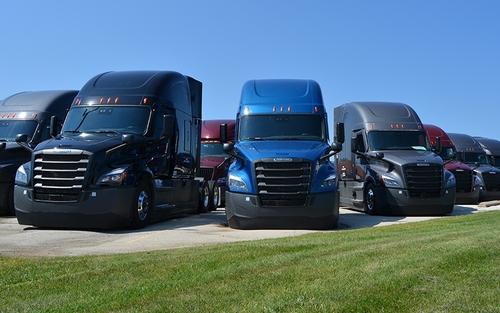5-step owner-operator startup checklist to help you succeed
November 18, 2025

Estimated reading time: 4 minutes
Starting a trucking company is an exciting opportunity to enjoy the freedom of being your own boss and the flexibility to get home when you want. Of course, there are many important decisions you must make first, from choosing what freight your business will haul to navigating essential paperwork.
If you’re a company driver who is considering becoming an owner-operator, check out this owner-operator startup checklist to help you hit the ground running.
5 items to consider when starting a trucking business checklist
1. Develop a business plan.
It’s a good idea to have a business plan in place before starting a trucking company. This can help you understand what to expect as an owner-operator.
As you put together a business plan for a trucking business, consider things like:
- Where you will operate your business.
- How often you will want to get home.
- What your business’ expected expenses will be, such as:
- Fuel.
- Truck payments.
- Truck maintenance.
- Taxes.
- Insurance.
- What your weekly revenue goals will be.
- What type of freight your business will haul, like:
- Dry van freight.
- Tanker freight
- Flatbed freight.
- Shipping containers.
- How you will get loads.
- This will help you decide how you will run your business: By contracting on with a carrier or by operating under your own authority.
- What business structure you will want to follow.
- What your business name will be.
2. Get insurance.
The way you run your business and the type of freight you haul can affect what kind of insurance you need.
If you run under your own authority
When you operate under your own authority, you are responsible for covering all your insurance needs. This can include:
- Commercial auto liability insurance.
- Commercial general liability insurance.
- Cargo liability insurance.
- Workers’ compensation or occupational accident insurance.
- Physical damage insurance.
Insurance requirements vary depending on what you haul. For example, owner-operators who move hazardous materials need extra insurance coverage.
If you do business with a carrier
When you do business with a motor carrier, the carrier will most likely provide some of the insurance coverage. The owner-operator may be responsible for, or may want to get:
- Workers’ compensation or occupational accident insurance.
- Physical damage insurance (per equipment finance agreement).
- Non-trucking liability insurance (often referred to as “bobtail” or “unladen” insurance).
You can visit the Federal Motor Carrier Safety Administration (FMCSA) website for more information on insurance filing requirements.
3. Buy or lease equipment.
As you think about how to start an owner-operator trucking business, you’ll quickly learn that your semi-truck will be your most important asset. You can get equipment by:
- Buying a used truck from somewhere like Schneider.
- Leasing a new or used truck from a place like SFI.
- Purchasing a new truck from a dealership.
The type of freight you haul and how often you get home determine what truck(s) and trailer(s) you need. Equipment considerations include things like:
- Sleeper and day cabs.
- Van trailers.
- Tanker trailers.
- Flatbed trailers.
- Curtain side trailers.
4. File for your operating authority and USDOT number.
The way you run your business will impact whether you need to file for your own motor carrier authority (MC number) and USDOT numbers.
If you run under your own authority
Trucking companies that operate under their own authority and haul goods across state lines are required to get a USDOT number, according to federal regulations. However, some states require intrastate motor carriers to have a USDOT number as well.
In general, most trucking companies that travel across state lines are also required to have an MC number in addition to a USDOT number, according to the FMCSA.
If you do business with a carrier
When you do business with a carrier, you run under its authority. That means you can operate under the carrier’s MC and USDOT numbers.
5. Complete other registration filings.
How you run your business will also determine what other registration filings you need to complete.
If you run under your own authority
Once you have your operating authority and USDOT number, you need to complete, among other items, your:
- Unified Carrier Registration (UCR).
- Heavy Vehicle Use Tax (HVUT).
- International Registration Plan (IRP).
If you operate in more than one state, you also need an International Fuel Tax Agreement (IFTA) account. You can apply for an IFTA account through your base jurisdiction.
If you do business with a carrier
If you do business with a carrier and operate under its USDOT number and authority, the carrier may handle some of the registration fillings for you.
As an example, here is what you can expect if you do business with Schneider:
- Schneider pays the UCR fees.
- Schneider facilitates the HVUT filing, but you are responsible for the cost (typically up to $550 per truck per year).
- Schneider provides the option to register your truck under its Indiana IRP account, but you can also choose to register on your own.



